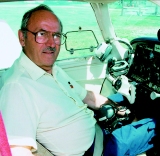

Magazine
Summer 1998
Tributes to Four Scholar/Teachers: Professor Bernard Manker
Sports Victories and Former Students Among Highlights of Manker's 35 Years
Bernie Manker lowers the right wing of his 1967 Mooney Statesman into a banking turn over Crawfordsville. We gaze out over the tapering white wing at the clay colored--composite track encircling the football field at Little Giant Stadium and the bright green roof of the press box. A profusion of green billows from the ground as the arboretum seems poised to overwhelm Center, Detchon, and Baxter halls.
Manker's voice crackles through the headset over the pulsing drone of the Mooney's engine.
"Looks a little different from up here."
I nod. In 35 years as a professor of foreign languages at Wabash, Manker has always brought an unusual perspective to the campus and to his students. But then his path to Wabash was more varied than most. A quick stroll through his home across the street from the arboretum provides a glimpse into that journey--a wooden chest from Spain, artwork, small sculptures and artifacts from Nicaragua and Bolivia, a small cart from Costa Rica. They are souvenirs of the cultures Manker came to admire when he served in the foreign service for six years with the United States Information Agency. And they are reminders of the world-tested experience and practical views that Manker brought to the teaching of Spanish at Wabash when he arrived here in 1963--a perspective the College will lose as Manker retires this year.
Manker was teaching high school in Michigan when he decided to join the foreign service in 1957. La Paz, Bolivia, elevation 12,500 feet, was the flatlander's first post. He acclimatized fairly easily, both to the elevation and the culture, serving as director of the bi-national center, a cultural program with English-language courses serving 3,500 students. Despite witnessing periodic anti-American demonstrations, Manker has fond memories of his time there. He met then-vice president Richard Nixon and served as liaison for the New York Philharmonic in advance of their tour.
When guitarist Charlie Byrd visited Latin America with a stop in La Paz, Manker was named his liaison.
"One of my most enjoyable moments came after hours, when Byrd finished his concert and we took him to a bar where this combo was playing," Manker recalls. "I introduced him to these guys, and Byrd got up there with his guitar. He didn't speak any Spanish and they didn't speak any English, but they all spoke music. They took off on 'Sweet Georgia Brown' and jammed, and it was inspirational."
Manker was soon to bring inspiration to Wabash. In 1963, after he and his wife, Cris, had spent six years raising their children in Bolivia, Nicaragua, and Valencia, Spain, Manker was ready to return to the U.S. How he got back and arrived in Crawfordsville is a typical Wabash story.
"I was the last person hired at Wabash sight-unseen," Manker smiles. "[Dean of the College Ben] Rogge didn't know me; [head of foreign languages] Dick Strawn didn't know me." Manker's only degree was a bachelor's from Central Michigan, his only teaching experience was at a Michigan high school, and his only Wabash connection was Professor of Chemistry Quentin Peterson.
"One of my jobs for USIA in Spain was supervising Fulbright scholars, and Peterson was on a Fulbright Scholarship there." Manker says. "I told him we were going to fold it up this time and come home, and he said, 'Why don't you come to Wabash?'"
What did Rogge and Wabash get from Manker? A fluency in the language and a practical understanding of Spain and Latin America gained from total immersion in those cultures. Manker brought authority to the classroom because 'he'd been there.' His first appointment was for one year, the second for three years, and the rest is history.
Manker's influence on campus extended outside the classroom and onto the courts--tennis courts, that is. In the days before Division III, he coached the Little Giants tennis team to a 12th place national ranking, and the highlights of his Wabash career include watching Beck Hanniford '71 and Jeff Eaton '71 win the doubles match that handed the Little Giants their first tennis team victory over DePauw in 47 years.
"That was a real sweet moment," Manker smiles.
Ties with alumni have been another highlight of Manker's years as a teacher. The high point of his visit to Nicaragua in 1986 was his stay with Brian Dickson '80, who was then vice-counsel for the U.S. State Department in Managua and provided him with insight into the Sandinista regime. He also visited then--Newsweek reporter Tim Padgett '84 in Venezuela during the same trip, enjoying both his former student's hospitality and his grasp of the region's problems and promise.
Retirement from teaching will find the Mankers on the move. This August they'll be in Mexico, helping to build houses for that country's version of Habitat for Humanity. Manker hopes to pursue more opportunities to help others.
"Our church supports an independent service center for missionaries in various countries, and we hope to contact these people and let them know that, if they need help, we'd like to volunteer."
